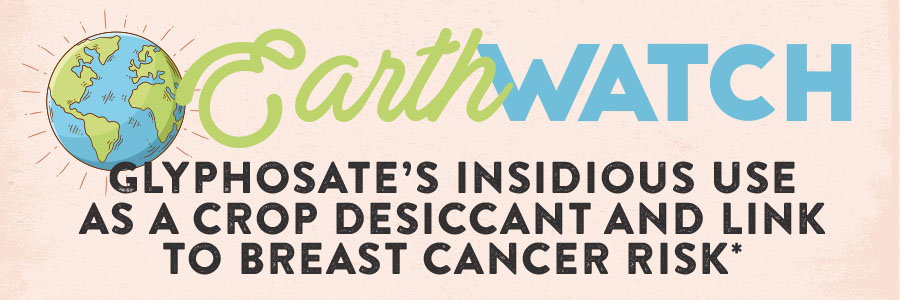


Sign-up for {N}power to get exclusive discounts, newsletters, members-only features, and more!
 Denver - Design District - Alameda and Broadway
Denver - Design District - Alameda and Broadway
368 S Broadway
Denver, CO 80209
United States
 Preferred Store:
Select a Store
Preferred Store:
Select a Store

Glyphosate, the active ingredient in Roundup weed killer, is the most widely use herbicide in the United States. The introduction of genetically modified “Roundup Ready” crops—which allow farmers to spray large amounts of the herbicide on their fields without killing the crops—in the mid-1990s dramatically increased its agricultural use, but another lesser known agricultural use of glyphosate is as a pre-harvest desiccant, or drying agent.

Many conventional farms, especially those located in regions with wet weather, commonly use glyphosate to speed the drying of crops such as wheat, barley, oats, and beans just before harvest, but spraying glyphosate on food crops right before harvest means higher residues end up in our food. In recent years Monsanto and other producers of glyphosate have requested substantial increases in glyphosate tolerance levels (legally allowable levels) in certain crops, which regulatory agencies have granted. It’s becoming commonplace to find high levels of glyphosate residues in conventional foods that are not made from genetically modified ingredients; for example, popular foods like granola and granola bars, breakfast cereals, and instant oats—products commonly marketed to parents as healthy, kid-friendly foods— have been found to have high residues of the herbicide.
In 2015 the International Agency for Research on Cancer (IARC), part of the World Health Organization, named glyphosate a probable human carcinogen, and just last year juries awarded a California man $289 million and a California couple more than $2 billion in lawsuits against Monsanto in which they claimed glyphosate caused their cancer, which the courts found to be valid. Currently, there are approximately 11,000 pending lawsuits against Monsanto and its parent company Bayer claiming the herbicide caused cancer.

With growing concern about the long-term health effects of increased human exposure, more research is being done to examine the connection between glyphosate and cancer. A 2019 study designed on the hypothesis that more than 90 percent of cancers are linked to environmental factors examined the effects of glyphosate on DNA and breast cancer risk. The study exposed breast cells to glyphosate for 21 days and observed genetic changes within the cells. Although glyphosate did not lead to tumorigenesis of the cells outright, the study found that glyphosate created genetic changes to the breast cell’s DNA that are consistent with the “two-hit oncogenic model,” showing that glyphosate-induced genetic changes have the potential to increase a person’s susceptibility to breast cancer. Studies like this should sound the alarm, yet glyphosate use continues to increase. One of the most effective ways to reduce your glyphosate exposure is to eat an organic diet, which has also been shown to reduce the risk of cancer.



Sign-up for {N}power to get exclusive discounts, newsletters, members-only features, and more!
